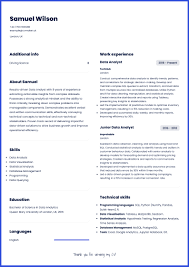The Role of a Graduate Data Analyst
Graduate data analysts play a crucial role in today’s data-driven world. These professionals are responsible for collecting, analyzing, and interpreting large sets of data to help organisations make informed decisions.
As a graduate data analyst, you will be tasked with gathering data from various sources, cleaning and processing it, and then using statistical techniques and software tools to uncover insights and trends. Your findings will be used to guide business strategies, improve operations, and drive growth.
To excel in this role, you will need strong analytical skills, attention to detail, and proficiency in programming languages such as Python or R. Additionally, good communication skills are essential as you will often need to present your findings to non-technical stakeholders.
Graduate data analysts can find employment in a wide range of industries, including finance, healthcare, marketing, and technology. The demand for skilled data analysts is on the rise as companies increasingly rely on data-driven decision-making processes.
Overall, a career as a graduate data analyst offers exciting opportunities for growth and development in the fast-paced world of big data. If you have a passion for numbers and enjoy solving complex problems, this could be the perfect career path for you.
Understanding the Role and Career Path of a Graduate Data Analyst: FAQs and Insights
- What is the role of a graduate data analyst?
- What skills are required to become a successful graduate data analyst?
- In which industries can graduate data analysts find employment?
- What tools and software are commonly used by graduate data analysts?
- How can I prepare for a career as a graduate data analyst?
- What are the typical responsibilities of a graduate data analyst in an organisation?
What is the role of a graduate data analyst?
The role of a graduate data analyst is to collect, analyse, and interpret large volumes of data to provide valuable insights for organisations. As a graduate data analyst, you will be responsible for extracting data from various sources, cleaning and processing it, and using statistical methods and software tools to identify trends and patterns. Your findings will help businesses make informed decisions, improve processes, and drive strategic initiatives. Strong analytical skills, attention to detail, and proficiency in programming languages are essential for success in this role. Effective communication skills are also important as you will need to present your findings to stakeholders across the organisation.
What skills are required to become a successful graduate data analyst?
To become a successful graduate data analyst, a combination of technical and soft skills is essential. Proficiency in programming languages such as Python, R, SQL, and data visualization tools like Tableau or Power BI is crucial for handling and analysing large datasets. Strong analytical skills, attention to detail, and the ability to think critically are also key traits needed to uncover meaningful insights from data. Effective communication skills are vital for presenting findings to stakeholders in a clear and concise manner. Additionally, having a curious mindset, problem-solving abilities, and a willingness to continuously learn and adapt to new technologies are important qualities that can set a graduate data analyst up for success in this dynamic field.
In which industries can graduate data analysts find employment?
Graduate data analysts can find employment in a diverse range of industries, including finance, healthcare, marketing, technology, retail, and more. These professionals play a crucial role in helping organisations across various sectors harness the power of data to drive strategic decision-making and business growth. Whether it’s analysing customer behaviour in retail, improving patient outcomes in healthcare, or optimising financial operations in banking, the skills of a graduate data analyst are highly sought after in today’s data-driven world.
What tools and software are commonly used by graduate data analysts?
When it comes to tools and software commonly used by graduate data analysts, there are several key ones that play a vital role in their daily work. Some of the most commonly used tools include programming languages such as Python and R, which are essential for data manipulation, analysis, and visualization. Data analysts also often use SQL for database querying and management. In addition, statistical software like SPSS and SAS are frequently employed for advanced data analysis tasks. Data visualization tools such as Tableau and Power BI are popular for creating insightful visual representations of data. Overall, proficiency in these tools is crucial for graduate data analysts to effectively extract meaningful insights from complex datasets and drive informed decision-making processes within organisations.
How can I prepare for a career as a graduate data analyst?
To prepare for a career as a graduate data analyst, it is essential to focus on developing strong analytical skills, proficiency in programming languages such as Python or R, and a solid understanding of statistical concepts. Consider pursuing relevant academic qualifications in data science, statistics, or a related field to build a strong foundation. Engaging in practical projects, internships, or work placements can provide valuable hands-on experience and help you apply theoretical knowledge to real-world scenarios. Additionally, staying updated on industry trends, attending workshops and conferences, and networking with professionals in the field can further enhance your readiness for a successful career as a graduate data analyst.
What are the typical responsibilities of a graduate data analyst in an organisation?
In an organisation, a graduate data analyst typically has a range of responsibilities that revolve around collecting, processing, and analysing data to extract valuable insights. These responsibilities may include gathering data from various sources, cleaning and organizing the data for analysis, conducting statistical analysis and data modelling, identifying trends and patterns, creating visualizations to present findings, and collaborating with team members to interpret results and make data-driven recommendations. Additionally, a graduate data analyst may be involved in developing and implementing data collection systems and strategies to optimize efficiency and accuracy in handling large datasets.

No Responses